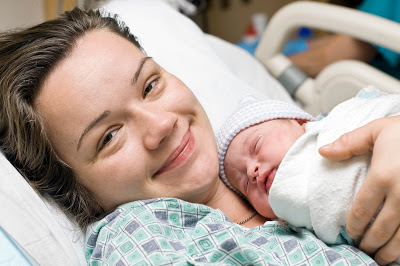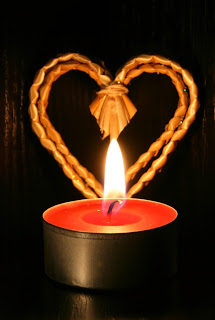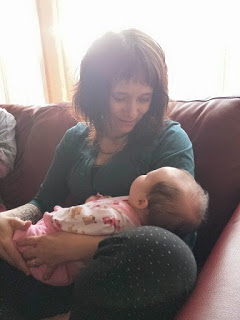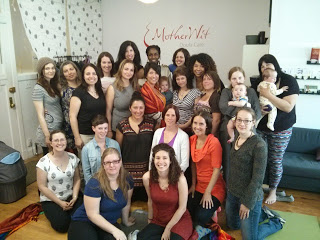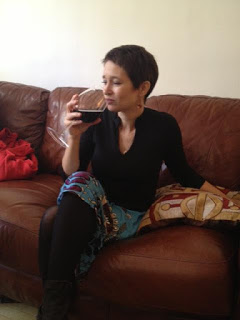
by MotherWit | Nov 2, 2015 | Uncategorized
According
to studies cited by PATTCh, an organization dedicated to the
Prevention and Treatment of Traumatic Childbirth (
www.pattch.org),
25 to 34 per cent of women report that their births were traumatic.
Everyone
comes to the path of childbirth with different values, needs, and
desires. There are no two pregnant women alike. As
radically different as “ideal” birth dreams are from woman
to woman, most agree that the experience of birth matters to them.
But
what if birth goes differently from what you had hoped?
As
a doula and childbirth educator for over 22 years, I have seen some
of the hopes and dreams women nurture during pregnancy dashed
violently against the rocks of surprise.
Here
are five ways to approach your birth day that will decrease the
possibility of not only disappointment, but of avoidable trauma.
They will also potentially increase your chances of
feeling like a rock star about your birth.
1)
Have Realistic Expectations
Upon
hearing women recount their birth stories, it is apparent that many
believe a labour that lasted 18 to 24 hours was long. In fact,
24 hours is normal for a first birth experience.
It
will serve you better to expect your labour to be on the longer and
harder side. This will inspire you to mobilize some techniques
to help you pace yourself. Patience is a key element in coping
with labour.
When
your expectations meet the reality of a normal labour, you will not
react with fear or concern. You will be more prone to remain
relaxed, which actually helps you to labour more efficiently. It
tends to be psychologically easier on women to discover they are more
advanced in their labour than they thought (providing they are in an
environment that feels safe to them).
If
you expect your body will open according to a formula that can be
dictated by an app, believing that times of contractions go according
to a dependable curve and can predict how close to full dilation and
delivery you are, you could potentially a) think you are WAY farther
along than you actually are, which is mojo crushing news to hear when
labour is intense, or b) birth in the car.
A
clock or an app can never tell you when your baby will arrive. You
will very likely know when it is time to take labour seriously
because your body will tell you.
2)
Prepare for the Unexpected
It
is a good idea to have some solid coping skills under your belt in
order to meet whatever labour throws at you with confidence.
You
may not end up with the natural birth you’d hoped for. You could give
birth too quickly to get that epidural you wanted. Or, you
unfortunately find your epidural doesn’t work quite the way you
thought it would. You may not have read the chapter in your birth
books on Cesarean, end up needing one, and experience more anxiety
than necessary because you didn’t have an idea of what to expect.
Take
good, unbiased, evidence-based prenatal classes that respect personal
choice and furnish you with simple labour coping techniques. Know
your options at your place of birth (including for your contingency
plans), because without clearly understanding what is available to
you and what your rights are, your options are limited.
Leaving
it all up to chance with an “it will be what it will be, the
experts will decide everything” attitude can deny you the
opportunity to truly own your experience. I have found this
approach to have a higher likelihood of leading to disappointment and
trauma.
Practice
your breathing and relaxation, which can be applied to any birth
situation, expected or not. Ensure your birth partner knows
some good massage techniques to help with comfort. Be open to
everything and attached to nothing. Stay centred.
3)
Find Your Centre
At
the end of the day, no matter how you end up at the big moment of
delivery, it is often the baby who decides how they need to come into
the world.
You
can indeed influence the quality of your birth experience with good
diet, good prenatal care, good prenatal education, and a positive
attitude which affirms that the normal birth process generally works
magnificently. But you cannot control the outcome. It is
ultimately a mystery.
What
you can do, is practice having some mastery over your responses to
what is going on inside you and around you. You can start now.
When something hurts or gets on your nerves, take a deep breath
and repeat to yourself “Nothing can disturb my peace,”
until you actually feel anchored to the changeless peace that rests
beneath every experience. Think of it like being the whole
ocean instead of just the waves.
This
way, you learn to discern that whatever is going on in your field of
experience is just one small part of any given moment, and it too
shall pass. Being centred helps you to refrain from jumping
down the rabbit hole of fear and tension in response to the
challenges labour provides. This will serve you as you work through
the sensations of your birth experience, as well as in difficult
parenting moments.
Your
ability to access this centre is the greatest tool to have when
contractions start coming on strong, or waves of anxiety threaten to
crash in on the day of your planned C-section.
Being
centred doesn’t mean you will behave with Zen like calm. It
just means that while you’re coping with labour in whatever way you
do (yelling being a perfectly valid way), you feel connected to a
source of inner strength and self-trust.
4)
Trust Yourself
Having
witnessed hundreds of births, I can tell you that in pregnancy,
birth, and motherhood, women often develop uncanny intuition when it
comes to their bodies and their babies. They may doubt it, as
intuition is not something we as a culture have a lot of practice
validating within ourselves, but it is there nonetheless.
As
a young pregnant woman, I was amazed at how intuitive I felt about my
needs for birth. I am glad I trusted them, as I sense my birth
experiences would have turned out differently had I not.
As
a mother of four, I rely a lot on my gut when it comes to making
parenting decisions, and you will too
As
you and your baby are a symbiotic unit, it isn’t a stretch of the
imagination to realize there is a deep connection between the two of
you, and can lend to your having insider information about what is
best for your situation.
5)
Get Support
Ensure
the people you have on your birth team know what you want, what your
greatest concerns are, and are prepared to stand by your wishes
whenever possible. They should take time to address your
questions and concerns, listen to you, explain your options, and
support your choices.
The
Cochrane Review, a well known medical journal states: “Continuous
support in labour increased the chance of a spontaneous vaginal
birth….and women were more satisfied.”
Support
can come in the form of a friend, a family member, or a professional
doula who is trained and experienced in providing information,
comfort measures, and empathetic guidance to women and their partners
throughout labour and delivery.
Having
felt supported, heard, understood, loved, and upheld as active
participants in their decision making process wherever possible is
what women report helped them feel good about their birth
experiences…even if they didn’t go as expected.
On
the day your little bundle of joy arrives, it is my greatest hope
that you feel like a rock star…no matter what! Because your
birth experience truly matters.
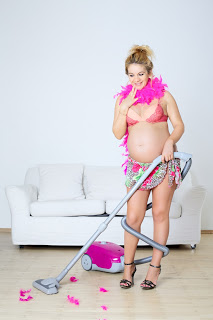
by MotherWit | Sep 29, 2015 | Uncategorized
I am not known across the land for my general housekeeping skills. Let’s just say, I’ll never make the cover of “Good Housekeeping”….unless I am pregnant!
While normally disorganized in the realm of maintaining an orderly home, I’m a total dynamo when I am with child!
I would get up in the morning when pregnant with my firstborn and have a cleaning schedule that involved dusting, washing base boards, and mopping, things I normally don’t pay much attention to until I have to rescue someone who has gotten stuck to my floor.
I’m not exaggerating when I say that at night while winding down before bed, I would crave the smell and feel of pristine white porcelain. I’d sneak into my bathroom just to run my hand along the tiles and sink, relishing in the untarnished gleam I’d created by polishing them within an inch of their lives.
Every time I got pregnant, my husband would say, “Oh, yay, the house is going to be so clean!”
It seems that soon after birth, however, the hormones shift, and housekeeping loses its appeal, the dust bunnies once again free to reproduce under my bed.
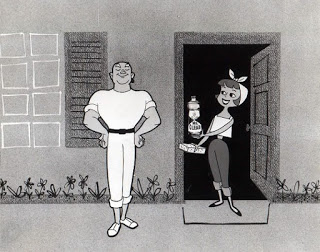 Aside from becoming a bonafide clean freak when pregnant, I developed a bionic nose. A lot of women report this, but I think mine operated at a startling level. Even though this is so counter-intuitive for a pregnant person who is supposed to eschew toxic chemicals, I fell madly in love with the smell of cleaning fluids. Not the fluffy, eco-friendly, gentle-enough-to-eat products. Oh no. My nose liked the really harsh ones.
Aside from becoming a bonafide clean freak when pregnant, I developed a bionic nose. A lot of women report this, but I think mine operated at a startling level. Even though this is so counter-intuitive for a pregnant person who is supposed to eschew toxic chemicals, I fell madly in love with the smell of cleaning fluids. Not the fluffy, eco-friendly, gentle-enough-to-eat products. Oh no. My nose liked the really harsh ones.
I could be set off into paroxysms of olfactory bliss by the merest whiff of a floor freshly washed with Mr. Clean. If I got anywhere near a big ol’ soapy bucket full of hot water and cleaning product, I had fantasies of swimming naked in it.
I knew these products weren’t good for me or my baby, so whiffs were guilty little hits I got unintentionally from other peoples’ homes.
If our paths had crossed outside of a laundromat, you may have noticed a look of ecstasy on my face and my feet floating above the earth at the sheer bliss of the warm, scented wafts of fabric softener. To my non-pregnant nose, fabric softener reeks of bug spray.
It wasn’t just cleaning products, either, that triggered this scent related glee.
The bike repair shop owner near my place must have wondered why this very pregnant woman would step into his place of business every day, take several large whiffs, then skulk out sheepishly. It was the smell of WD40 I was after. And don’t get me started on gas stations! The tantalizing fragrance of gasoline when we pulled in to fuel up had me bewitched.
As we know, smell is related to how we experience flavour. When pregnant, it felt like my taste buds were on steroids.
I use to be a card carrying member of the “I Hate Cilantro” Club. If there were remnants of the foul green stuff on my food in a restaurant, I couldn’t eat it. Cilantro made me angry. And then my third kid was conceived.
Like a switch flipping on in the taste centre of my brain, I began to crave the smell and taste of cilantro with a mighty passion. I couldn’t get enough. I put that stuff in everything. I wanted to wear it as a necklace so I could smell it and nibble it throughout the day. Oddly, though giving birth took the edge off my nearly obscene love of cilantro, to this day it remains my favourite culinary herb.
As high as the highs were in my pregnant experiences of smell and taste, the lows were just as intense.
When I got pregnant with my second kid, before I even knew he was in there, I developed a strong desire to bake my own organic rye bread. Don’t ask me why, I have no idea, but I did. I went to an organic co-op and bought a bag of rye flakes with the intention of creating magnificent loafs.
When I got home, I opened the bag to smell it, expecting something tantamount to an olfactory orgasm. But no! Like a slap in the face, the smell of the rye flakes triggered a nausea deep within that was practically existential. I tossed the bag wildly into the cupboard and ran away to hide under the bed covers until my husband came home to remove the offending object. I whimpered pathetically until he assured me it was gone.
To this very day 21 years later, the mental image of that poor innocent bag of rye sitting forlornly in the cupboard makes me feel ill.
When I was pregnant with kid #4, I discovered a gorgeous white tulip growing in a neighbour’s yard. It was so pretty and inviting, that my pregnant nose couldn’t resist going over to sample whatever delectable scent it might have to offer. I buried my nose in, breathed in deeply… and almost dropped to my knees from the wall of stench that hit me.
That devious little tulip was evil. I can only describe its smell being as if something had crawled inside it and died. My family couldn’t figure out why I found it so offensive when they smelled it.
Even weirder, was that it smelled SO bad, I couldn’t stop myself from sniffing it every time I walked by, just to reassure myself that it really was as horrific as I had remembered it.
It has been ten years since I’ve had a baby of my own, but my work as a doula gives me plenty of opportunity to enjoy quirky stories of how pregnancy literally messes with the senses.
Pregnancy can be weird. Enjoy!

by MotherWit | Sep 2, 2015 | Uncategorized
 My name is Lesley Everest, and I am a wildly successful doula.
My name is Lesley Everest, and I am a wildly successful doula.
Success means different things to different people. When I speak of success, I don’t mean that I’ve struck it rich and dash off on a private jet to exotic vacation spots whenever I want. I honour that may sound like success to others, and if that’s your definition, awesome! If that were given to me, I wouldn’t say “no”.
Success, though, to me, means looking upon the things I have experienced, at the trajectory my future appears to be taking, and being very pleased with what I see. It is also about knowing that whatever happens, nothing can disturb my peace.
I want it to be clear that I share my success not with any intention to crow about it. I am not any more special than any other doula out there. I am no more or less deserving than anyone else. I share this because I want you to feel amazing about your achievements, wherever you are on your path, and honour yourself for all you have done. It is my hope that by owning your magnificence exactly as you are right now and shining in gratitude for what you already have, you open to the blessings wanting to pour into and out of you. May this inspire you to walk forward fearlessly on your path.
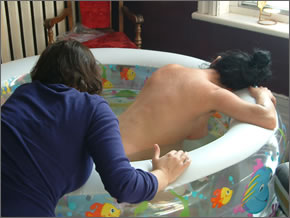
I became a doula in 1993, having been informally studying midwifery for a year or so. I was 24. I had a little daughter. There was nowhere to train here in Montreal at the time. As an English speaker from the Canadian Prairies, there was not much available to me educationally within the primarily French speaking province of Quebec. I can get by in French (shyly and painfully), but my passion for all things birth was so fierce, I wanted to ensure I understood everything clearly.
I was already a member of La Leche League, on my way to becoming a leader. The seeds of the immense value inherent in good community support were sown early on my path by my mentors Melissa and Susanna. These kind, strong, knowledgeable, experienced mothers gently supported my unfolding as I began to shape my path in mama/baby/family care. To this day I owe my approach of supporting people exactly where they are, not where I think they “should”, be to these amazing La Leche League Leaders.
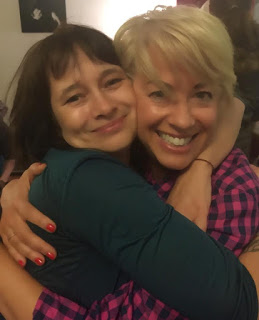
I was very much wanting to become a midwife, and believed doula training would be a great stepping stone towards that goal. I read in a birth related magazine (I had no computer and had never heard of the Internet at that time) about a doula training that would be happening a few hours travel from me in Boston. I decided to pack up my family (my husband agreed to stay near the training to mind our still breastfeeding toddler) and take the weekend workshop. Less than a month later, I put out my shingle and began going to births.
Being a La Leche League-er and part of a thriving baby-having and breastfeeding community, I got plenty of opportunity to serve as a doula. La Leche League has a strong “no advertisement” policy, so I was mindful to not promote my services to anyone within meetings. But if in private conversation with the pregnant women they asked what I did for a living, I told them. If they felt like my presence was something that would be helpful to them in labour, they would call me privately. I volunteered with the Teenage Mother’s Association through the YWCA for some of my first few clients as well. I never advertised my services anywhere. I would just talk to everyone I met about the work I did, and found people were responsive. Nobody had ever heard of a doula before where I lived. I was a mother very active in my community, and my presence, combined with my training and growing experience, were my calling cards. Because I didn’t actually have any business cards at the time.
Over the years, I gave birth to more children. I homeschooled the first two in their early years, and attended births on a small scale. We had very little money at the time, so doula work was an important part of our income. But being home as much as possible with my kids was a priority.
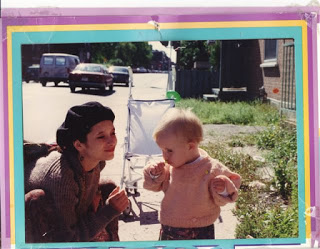
I immersed myself in education. Committing to doula work for me meant being able learn all I could. With breastfeeding little ones, I was fortunate to find continuing education trainings I could bring babies to, or ones that weren’t far from my home so I could minimize my time away. My husband was always supportive of the fact that even though we didn’t have a lot to spare, I always reinvested some of my earnings back into education. In fact on weekend intensives he would bring the nurslings to lunch times and breaks. I knew education was something that would enrich my doula work immeasurably, and was willing to pay for it. That meant for a few years I barely bought so much as a sock for myself, nor read anything that wasn’t a textbook, but given how that has paid off, I don’t regret it a bit.
I didn’t just want to be a doula, I wanted to bring a healing perspective to what I experienced was a very challenged birth culture. I wanted to do that one mother, father, and baby at a time by supporting births that made the family feel powerful. I have always believed Western Medicine is a wonderful thing, but I could see how some of its shadow side sometimes impacted birth in a negative way.
Of course, as a young doula without the benefit of Internet and supportive global connection to wise and experienced doulas back then, I had formed a lot of opinions about what a good birth was. I only had books and my community’s experience to go on. I was genuinely confused as to why anyone would want to have a baby in a hospital if they were healthy. It took time, experience, and growth to develop a non-judgmental approach to birth that came from my heart, and wasn’t just a slogan in my mind.
I was constantly learning in the early years. I couldn’t get enough. I still can’t! I became an accredited La Leche League Leader, working with my accreditation supervisor through lengthy hand written correspondences, often writing in the wee hours between bouts of tandem nursing.
I studied and certified as a Polarity Therapy Practitioner over a period of 3 years, which is a form of energy based healing that encompasses hands-on bodywork (much of it cranial/sacral based), nutritional support, exercise guidance, and dialoguing with the client about their emotional process throughout the session. I did a three year professional training in Psychosynthesis Psychotherapy, which is a transpersonal approach to counseling.
I was fascinated with the mind/body connection in birthing! I also learned about aromatherapy from an Ayurvedic perspective and became obsessed with essential oils, read everything I could about Ayurvedic healing and massage (having learned some massage from Ayurvedic practitioners), and eventually traveled to North Carolina to certify in Pre- and Perinatal Massage with the outstanding Carol Osborne. I’ve done workshops in Thai Yoga Massage for Pregnancy and continuing education classes in Cranial/Sacral Therapy.
All the while, I still attended births in the capacity I could given all that was going on with bustling family life. I had all the births I wanted. .
Finally, when my third child was old enough to go to Kindergarten, I said, “Okay, Universe. Let’s do this.” I was at this time working with an amazing partner for backup, and things took off. My partner Rivka and I developed a doula training in response to all the hard ways we had had to learn the ins and outs of doula work on our own due to lacks in our own personal doula trainings. We made some beautiful magic together. Home computers and Internet were now in most households, and the ability to email revolutionized communication. Suddenly, I didn’t have to search my library of books for answers to questions. Everything was at my fingertips.
It was at about this time I got my first cell phone. No more calling my answering machine at home to check my messages from a pay phone every time I was out for more than an hour! I had a pager, but I learned that it didn’t notify me of pages if I was in the Metro. I got to know where every phone booth in town was, and was always jingling with pockets full of change.
I was so in love with hands on bodywork that I applied to a school of osteopathy in Toronto. I was accepted, but then found out I was pregnant with baby number 4. Knowing that monthly travel to Toronto for five days at a time over five years was going to impossible with a new kid, I had to turn down my acceptance. I was still so pumped to learn more bodywork, so I began my studies in Kinetic Swedish massage locally. I continued attending births and passed my clinical requirements with flying colours just a couple weeks before I gave birth. I had to make up classes on occasion because of births taking me away, but my instructors were always very supportive.
I took a short break from doula work to have my baby, and began attending births again as well as continued training Montreal doulas just a few months after birthing my son (I brought him to class with me). I wasn’t happy going to births then, though. It was hard for me to support other moms and babies when all I wanted to do was be with my baby. But with a family of six and a mortgage, I had to work. I remember crying in the bathroom with aching breasts, wanting my baby so much. It wasn’t until he was about 3 years old that I felt okay about leaving him for those long hours. In spite of my feelings, however, my son thrived with the loving attention from the rest of his family, and he was fine with it. But if I could do those few years over again, I would have done a shared call service. There were just not experienced doulas with that kind of availability in town I could have that with at the time.
As the years passed I got busier and busier. Five year ago I decided that I wanted to end my doula partnership and begin an agency. I was tired of turning so much business away because I was only one person with a handful of backups, so I figured I would build a community of doulas and be able to have a wider reach of service, as well as receive a percentage of the revenue I dispatched to others. I didn’t know of any other agencies at the time.
What I realize now was that births were becoming more plentiful because my partner and I had been training more doulas, and they were going out into the world and spreading the message, getting the word out. The more trained doulas there were, the more work was coming in. The Internet also was a great help to the promotion of doula work.
My friend Sue had done a standard two day doula training and had found it great in many ways, but lacking in others. She is delightfully straightforward, and told me that she had a large gorgeous home to provide, and that she wanted to learn from me and would do whatever it took to make that happen. I took the elements of the doula training I had previously taught that were of my creation, and from there birthed a whole new training. It was retreat style. For six days and nights we talked, ate, and slept birth. The attendees affectionately called it doula camp. The women in the training inspired me to get my agency going in a very real way, to organize, and to bring bring my now years of experience to the world. They had so much to give, and I wanted to make sure they could do so with good return.
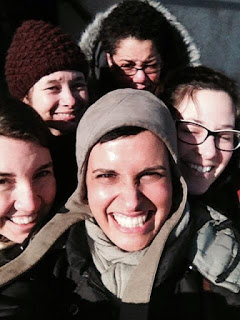 In November 2010, I plucked the willing ladies with whom I felt a deep connection and added them to a couple of amazing women I had trained in the past who were interested in working with me. I found a loft space for us as a headquarters, and MotherWit was officially born. I have used the MotherWit name for my own personal business for most of my career, but now it was an
In November 2010, I plucked the willing ladies with whom I felt a deep connection and added them to a couple of amazing women I had trained in the past who were interested in working with me. I found a loft space for us as a headquarters, and MotherWit was officially born. I have used the MotherWit name for my own personal business for most of my career, but now it was an
organization.
It has been almost five years we’ve been together, losing and gaining a few members along the way, and I am so very proud of us!
I took several doulas with little to no hands-on experience and built the doula community I wanted to see. Within not even five years, our little MotherWit Doula Care company has attended around 700 births. We are a linguistic minority, serving mostly the English speaking population of Montreal, so our client pool is quite small. When I say we have attended 700 births, I am not including the hundreds I attended prior to the forming of MotherWit. I am also not including the volunteer births that have been referred to my apprentice doulas through organizations who take care of pregnant families in true need. I mean 700 paying MotherWit Doula Care clients attended doula-style, with continual labour support with our typical pre/postnatal support meetings.
My Birth Essentials Pre-Natal Classes took off quickly, and fill up most months. We’ve taught over 500 people our course in childbirth empowerment. A large percentage of our students come from physician referral. We also run a Mom’s Meetup group, which our clients love.
MotherWit Doula Care hosts a monthly doula gathering, open to any doula from any organization who wants to join in, for an evening of birth story sharing, wine, and sisterhood.
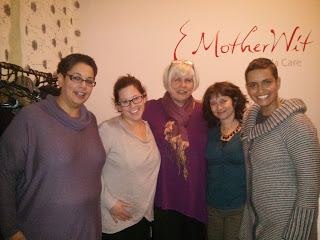 We are even joined on occasion by medical folks who want a hit of that kind of camaraderie. One day Gloria Lemay joined us for an impromptu film showing. Another time Gena Kirby came to hang out.
We are even joined on occasion by medical folks who want a hit of that kind of camaraderie. One day Gloria Lemay joined us for an impromptu film showing. Another time Gena Kirby came to hang out.
I have taught Holistic Birth Doula Trainings and accompanied MotherWit Birth and Postpartum Doula Extraordinaire Millie Tresierra to Holistic Postpartum Doula Trainings in cities in Canada. I have personally brought around one hundred apprentices to births.
I have brought my “Soft Skills for Medical Professionals” workshop to several hundred McGill nursing students, and have taught groups of new nurses doula skills in their hospital. I have taught workshops to medical residents and family physicians on various aspects of comfort measures for labouring women. Some have come up to me years later to say, “What you said changed my life.” I don’t take that personally, as I didn’t tell them anything I invented (I didn’t create Birth). I just told them stuff their trainings didn’t. I didn’t go out trying to get this to happen. They invited me, and continue to do so.
 I have traveled to Madagascar with a midwife and doctor friend at the request of dear former clients of mine, doing educational exchanges with indigenous Rain Forest Midwives, sleeping in tents miles away from the nearest road or “civilization”. I have experienced the uterine massage the midwives do to heal infertility, have tasted the herb dingadingana they use to stop postpartum bleeding, saw the smallest baby I’ve ever seen outside an NICU, and so many more things that would be a book in and of itself.
I have traveled to Madagascar with a midwife and doctor friend at the request of dear former clients of mine, doing educational exchanges with indigenous Rain Forest Midwives, sleeping in tents miles away from the nearest road or “civilization”. I have experienced the uterine massage the midwives do to heal infertility, have tasted the herb dingadingana they use to stop postpartum bleeding, saw the smallest baby I’ve ever seen outside an NICU, and so many more things that would be a book in and of itself.
I have been to quite a few conferences, and recently was a presenter at the last Birth and Beyond Conference. That was pretty amazing, as I had a one on one breakfast with Ina May Gaskin, champagne with Dr. James McKenna, and lively dinner discussion with Dr. Jack Newman. I am a total unknown from Canada, so these are special moments I hold very dear. I have learned so much from these people and their bodies of work, and I was in fan girl heaven to pick their brains and listen to their stories.
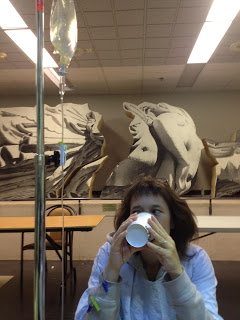 I have worked REALLY hard to not only have people receive the benefits of doula care, but to create a community for doulas to be supported within, creating good education and a strong self care ethic for those who are crazy enough to want to be doulas. I am prone to overwork, and have been known to work through times of not feeling my best. This has caught up with me at times.
I have worked REALLY hard to not only have people receive the benefits of doula care, but to create a community for doulas to be supported within, creating good education and a strong self care ethic for those who are crazy enough to want to be doulas. I am prone to overwork, and have been known to work through times of not feeling my best. This has caught up with me at times.
When I learned how truly successful I was had little to do with my bank account, the sixty plus births a year I personally attended, the hours of professional trainings under my belt, the many students I put on the path of birth, the success of my childbirth education class, the medical professional teachings I did, or any of that. It came when, three years ago, I was diagnosed with cancer.
It wasn’t just dysplasia or lump that could be taken out. I had invasive cervical cancer that had grown through my pelvic walls, was compressing both of my ureters and cutting off my kidney function. I was hemorrhaging dangerously, and I was in renal failure. I had to get tubes inserted into my kidneys and wear these not so sexy pee collection bags strapped to my legs for months at a time. The prognosis was bleak.
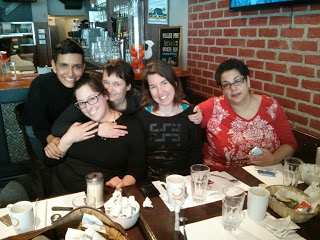
When I announced my illness with a sense of sorrow and even shame (yes, I felt ashamed that I was being a burden…not good), this is when I was smacked in the face with what true success meant. I cannot even describe the outpouring of love, prayers, gifts, vigils, food, and good wishes that came my way. My friends, spiritual community, and global doula family were powerful allies in my healing process. My MotherWit team took over the doula trainings I had scheduled. They took over my many clients in addition to their own busy schedules. They did this without any expectation of payment. I tear up even just writing about it. My agency revenue helped to support my family while I couldn’t actively doula, and was so grateful for the doula prosperity I had established.
When I was gravely ill, in terrible pain, zonked on morphine, sick from radiation, achy boned from chemo, bedridden, worried about a loss of income and terrified for my very life, to have kind eyes to look into, to know my family was being helped, to know that so many beloveds had my back, is worth more than anything I can even describe.
I have many daily affirmations, but this one I hold dearest to my heart: “I am motivated only by love.” Things tend to take care of themselves with that. If you’re skeptical about love putting food on the table, know that this motivation is largely responsible for the fact that my doula work has evolved as it has, not through SEO (I didn’t even know what that meant until a year ago), or spending money on branding (though I know love AND these things have helped other people, so yay! I’m just talking about me, here.). I commit to giving the best service I can. The best advertisement is a job profoundly well done with a wonderful attitude towards all involved. It is like passing out 100 business cards, as satisfied customers rave about you.
I am not motivated by any desire for power. I have no desire to dominate anything. That would take far too much work and stress, and then I wouldn’t have time to do the brunch/spa dates that are so important to me and my team for self-care. Besides, power driven dreams are the machinations of Ego, and don’t speak to the heart of service, which is what the healing of this birth culture requires. When I meet prospective clients, I don’t go into the meeting only selling myself. I see myself promoting “the work” and all the doulas who do it. The desire to dominate is what has created much of the world’s suffering. Prosper and thrive, though, YES!
 My motivation isn’t to be stinko rich. I am crazy wealthy compared to most people on our beloved Earth. I can barely keep the little house I have organized. Why would I need something bigger for a family who is growing and moving out? My garden is beautiful, and that is what makes me happy. Food is plentiful, shelter is good, and we have everything we need.
My motivation isn’t to be stinko rich. I am crazy wealthy compared to most people on our beloved Earth. I can barely keep the little house I have organized. Why would I need something bigger for a family who is growing and moving out? My garden is beautiful, and that is what makes me happy. Food is plentiful, shelter is good, and we have everything we need.
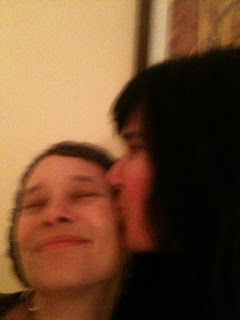
“I am motivated only by love.” So when I felt overwhelmed by the tsunami of love that flowed my way when I was sick, there was always a hand that would grab mine and a voice to say, “all the love you have put out, is coming back to you in your time of need.” I heard those words from people several times per day. It can be HARD to rub all that concentrated goodness into your heart when you have spent time in the the cancer wards as a patient, been to Third World countries, and know others in the world are suffering terribly. But I did. I breathed the love in. I dared to own it. I drew it into all my cells consciously, and I swear, combined with the good Western Medicine, the healing ceremonies my dear friend Nat made sure to get me to, visits with spiritual healers, and the love of my doula sisters and clients from around the world, I dug deep and I HEALED!
When my body’s wellness caught up to my strong spirit, I went back to doula work, but gently, jut to keep my finger on the pulse of the living work. I will no longer do more than twenty births per year, just to keep my feet in. I like the idea of childbirth educators and doula trainers being actively connected to the work. Before illness I had made great money going to a lot of births and having a crazy teaching schedule. But no amount of money was worth what I put my body and my family through.
I take more time off now. My team and I went to Vegas last year on an enforced doula holiday, leaving our clients in the hands of very capable doula backups. Nobody gave birth while we were away, however, which is weird, because one of us is always at a birth. But for those of you in the know, it’s how Birth often rolls.
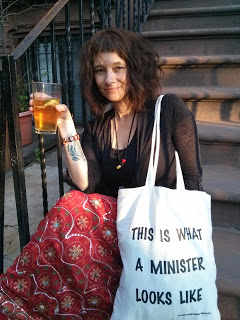
When I got well I also knew I had to continue to give back all that beautiful love. To make a long story short, at the behest of many persistent dreams, I joined the One Spirit Interfaith/Interspiritual Seminary in New York City. Before the post cancer treatment PET scan was even clear, I knew I wanted to become an interspiritual minister (I am not religious, but spiritual) to help all people (not just birthing and parenting people) find their connection to their own inner wisdom (motherwit). After two years of study (in person sometimes and through distance learning), my ordination was celebrated at the Riverside Church in Manhattan. My MotherWit Doula Care team joined me in New York City to celebrate. Not just my Montreal crew, but also former team members who had moved across the continent. We had a BLAST.
During my seminary training, I learned to volunteer in patient care in hospice, participating with those about to leave this life. I love end of life care, and will continue to develop my skills in that area. Holding the space for dying has become as moving as holding the space for birthing.
I have studied and become a Shamanic Reiki Master Practitioner with the amazing Llyne Roberts at the Omega Institute in Rhinebeck, NY. This has brought my work with birthing families and doula training to another level.
I have really enjoyed watching doulas become more business minded as years go by, and seeing doula work growing into a more substantial and sustainable profession. I have always ensured that my trainings gave the solid foundation to the product being sold, for the sake of the buyers and the doulas themselves. It is good that doulas can take their service and sell it with integrity with all of the tools and business insights/trainings that are now available. And I always encourage mindfulness about not allowing the product (your service) to overwhelm the product capacity (your own energy). Because if you burn out, that is one less person doing the good work. That hurts all of us.
Business continues to grow.
One of my favourite aspects of growth is that MotherWit is now our family business. My husband Mitchell is a vital part of the organization. He gets overlooked a lot, because he’s very behind the scenes. There is a beautiful poem by Margaret Atwood called “Variations on the Word Sleep”. There is a line that says, “I would like to be the air that inhabits you for a moment only. I would like to be that unnoticed and that necessary.” This is how my dear, humble Mitchell, my rock for over 25 years, operates. He stays home and keeps the running of things as smooth as possible. He points me in the direction I need to go and I go. I am so busy mothering, doula-ing, teaching, talking to people, and writing content for classes and manuals, dealing with students, pursuing studies, etc., that I can’t run this ship on my own. Without Mitchell, I couldn’t be doing what I’m doing. If you ever think of MotherWit, send my husband a loving thought.
I have learned a lot about promotion and organization over the years. This old dog definitely has learned new tricks, but there are bandwagons I haven’t jumped on, though if they work for you, more power to you! Telling you what I do or don’t do is in no way a judgement of what you yourself are implementing in your business. We need all approaches, and I thank all of those who seek to have doulas empowered to own their worth and support their families doing what they love. You are bringing healing.
At MotherWit, we don’t, for example, hand out information packages to prospective clients. I’m an old hippy, I used cloth diapers for my kids. I just don’t want to spend the time and money creating these things, though I think they could be valuable for newer doulas who haven’t yet established a reputation in their communities. My team is adamant about not wanting to put time limits on birthing clients or doing shared care. Not because it’s not okay to do those things if you want but because we generally really love our work and our clients, and are experienced enough at pacing to not find ourselves at super long births very often. Plus, none of us have kids under double digits, so it works for us. We are in for a penny, in for a pound. But we also know that we can rely on a colleague whom the client has met to relieve us of doula duty if we are over-tired or our families need us. Nobody needs to overextend themselves.
I don’t have a target market. If you want a doula, you’re nice, we speak the same language, and you value what I have to offer, you’re welcome to purchase my birth doula services. I fully believe that I don’t have to have any kind of crafty edge to seal any deals. It is my doula service someone is buying, that which comes from my hands, my eyes, my words, and my heart, not any kind of concept. A pregnant mother/couple wants to feel safe and cared for by someone they click with. I will never force a “click” because I need to hustle for money. I trust that if on the odd occasion it doesn’t feel like a great fit, another doula will take that place, and that is wonderful. Another door will open for me. Because every time a client finds the doula of her dreams, that is ALL of our success. The more doulas there are out there in my town, the more people will know about us and the 90 per cent or so of people who don’t really know much about doulas will be tapped into, and hey, that’s great for EVERYONE! I have seen this principle in action over the years.
 I believe in good business ethics. Don’t tear other people down. Don’t get sucked into drama. If you’re so worried about other peoples’ business, who’s minding your own? If you make a mistake with your client or a colleague, learn from it and make sure nobody falls through the cracks again. And for Pete’s sake, be original! Create your own ideas and formats. Obviously, there is nothing new under the sun, and customs do develop in doula business, which is fine. But work them your own way. You have it in you! Let’s not take cookie cutter approaches to something as huge, mysterious, and awesome as birth support.
I believe in good business ethics. Don’t tear other people down. Don’t get sucked into drama. If you’re so worried about other peoples’ business, who’s minding your own? If you make a mistake with your client or a colleague, learn from it and make sure nobody falls through the cracks again. And for Pete’s sake, be original! Create your own ideas and formats. Obviously, there is nothing new under the sun, and customs do develop in doula business, which is fine. But work them your own way. You have it in you! Let’s not take cookie cutter approaches to something as huge, mysterious, and awesome as birth support.
We all struggle with Ego and rub up against fear that there is threat to our livelihood, or that someone else is getting more than we are. I still find myself there on occasion. We are human. It’s gonna happen. Breathe. Relax. Let it go. There is more than enough to go around and room for everyone to shine. Let your competition’s success be a victory in your own heart, and wish them the good things they deserve on this crazy doula path. Trust. May the seeds you sow with your hard work and nourish with your love and care bloom into an ethical practice of integrity and wild success. Only that will truly nourish your work and life in a real and sustainable way. It may sound hokey, but I really do believe that an open heart allows prosperity to flow to us more easily than one that is shut down in fear or is motivated by egoic concerns.
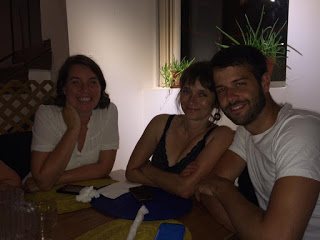 I am blessed after a long career to have made close acquaintances with medical caregivers (even having attended some of their births). Some of them have become dear friends. The great thing
I am blessed after a long career to have made close acquaintances with medical caregivers (even having attended some of their births). Some of them have become dear friends. The great thing
about having conversations about birth over cocktails with a friend is that you gain a deeper understanding of their perspective. You are so proud of them for what they’ve accomplished, and hear their challenges with much compassion. Your faith that women in birth CAN have it all when a bunch of loving people from different paths come together is bolstered.
When I say I am wildly successful, I mean that on a physical level, I have all I need and more. I am rich in story, rich in experience, rich in love. In every moment, as my beloved mentor Frank teaches me, I can ground myself in the goodness of my many blessings. I can put my hands on the sacred Earth, stretch my arms into the vastness of the sky, drawing in energy, breathing out love and blessings, and say, “I am WELL, I am ENERGIZED, and it is a GOOD day to be alive!” Not feeling that way? Say it anyway! Continue to say it until it is true. Don’t like the vibe of the birth community in your town? Don’t like how your practice is going? Be the change you want to see! Don’t listen to me, do what your own gut says. You have a path. Walk it the way that works for you.
May you only be motivated by love, and then do the hard work with fire in your belly to bring the healing our service provides. The prosperity tends to follow if you deeply value YOU. It isn’t easy to grow and sustain a thriving doula practice, but as a very wise Grandmother once told me, “If it is FOR you, it will not go BY you.”
The only thing you take with you when you go, Dear Ones, is love. Trust me, I’ve seen it in the eyes of the dying. The love and peace you feel going out is often about how much love you’ve put in. So be generous with your loving. I have seen it come back to me a thousandfold. Have good boundaries, of course. Give your love freely, but get paid well for the services you provide, though trust those times your intuition tells you to give your service away to someone. If this is true intuition talking, this will not happen more than you can handle. Don’t be attached to the results of your heart felt efforts(because we can only influence, not control), take great care of YOU, remember why you’re doing this in the first place, learn from the hard experiences, and ENJOY the ride. But most of all, love with no questions asked. That is the secret to a wildly successful life.
May you doula in all your glory! You are beautiful. Learn it. Live it. Love it.
Love,
Lesley
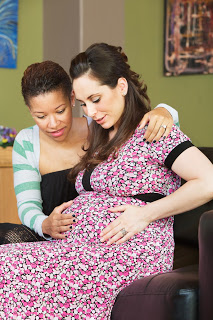
by MotherWit | Aug 28, 2015 | Uncategorized
Dads and Moms who are about to witness their partner give birth often have many concerns. As a childbirth educator, doula, and friend I have been asked by over a thousand concerned birth partners:
“What is the best way for me to help?”
It doesn’t matter where you come from or how much mastery you have in other areas of your life. When you have never before witnessed birth and are about to step up to the task of supporting your beloved on a journey famous for its intensity and unpredictability, it is normal to feel reduced to the status of “rank amateur”.
Here are five tips to build your confidence and help you support the birth of your child like a pro:
1) Get Educated
Take a prenatal class that is geared towards giving you skills to work together with your partner to effectively promote comfort and relaxation throughout pregnancy, labour and the postpartum period. Make sure your options and rights will be outlined in a way that is objective and evidence based, respecting whatever choices your partner and you are thinking about making for the birth and early days of parenting.
Chat with your prospective childbirth educator before choosing a class. Active experience in the field of childbirth and mom/baby support as well as an established excellent reputation with the doctors, nurses, and midwives in your area means your educator will have valuable insider knowledge about your place of birth. A good prenatal class will help you to feel inspired, confident, and empowered to support your partner no matter how birth unfolds!
2) Be Present
At the end of a birth, when Baby is safely in arms, the birthing mama will usually beam at her partner and say, “I couldn’t have done it without you,”. The partner sometimes looks surprised because they may not feel like they were particularly useful in easing most of the discomfort. Remember this: it isn’t about what you DO, it is about how you BE. Birth is hard work, and while you can’t do it for her, birthing moms appreciate feeling like you’re fully available to be leaned on for physical and emotional support. You helped Baby get in there (whether biologically or not) with love. It is love that will help get it out.
Since the advent of smart phones and tablets, the opportunity for distraction is always available. It is common to hear of partners frequently updating folks outside the birthing room as to what is going on inside of it. Whenever possible, TURN OFF YOUR DEVICES! Birthing folks don’t like feeling their partner was connected to everyone else but them.
Birth is hard. You are needed. And you only get to have this baby once. Generally the more present you are, the richer and more bonding the birth experience can be for the family. Birthing individuals report that what they appreciated most in labour was not the fancy massage techniques their partners used or how handy they were with a stop watch, but simply how THERE they were, tuning into and quietly meeting their needs.
3) Protect the Space
I repeat: birth is hard. Amazing and thrilling, but challenging. Though birthing mothers are the strongest people ever, they are also vulnerable to environmental factors that can impact the groovy hormonal flow which gets the job done. Communication skills are hard for mamas to summon when in the throes of strong labour.
Protecting her space means being a strong but gentle buffer for environmental distractions. Especially in a hospital birth, many questions have to be asked and things explained. If you are able, field the questions you can, especially if your partner is having a contraction. If you feel that a staff member is not understanding your partner’s needs because she is too absorbed in her labour process to articulate the way she normally does, participate in the communication. Having good prenatal education under your belt and having a clear understanding of your partners’ birth preferences will help you be effective with this task. Doing so in a friendly way is always best for everyone.
If there are family members/friends who show up to your place of birth uninvited or are contributing to the environment in a not so helpful way, lovingly explain to them that they need to leave/stop calling the room. Reassure them you will give them news AFTER the baby arrives. If their excitement is greater than their tact and you don’t want to create drama, you may engage your nurse (who has your back) to play bad cop and enforce the hospital rules about too many people in the room/clogging up the waiting room.
4) Stand up for Birthing Mom’s Wishes
 What goes on in a birthing woman’s body is best known to the woman herself in partnership with her caregiver. If a woman had certain plans or expectations about labour, it is possible these
What goes on in a birthing woman’s body is best known to the woman herself in partnership with her caregiver. If a woman had certain plans or expectations about labour, it is possible these
things may change as the experience unfolds.
Your voice is important. This is your kid too. Your loving encouragement can help soothe the rough edges and get her through the hardest bits. You will discuss decisions together. But in the end, the choices will be hers. If she wants to birth naturally and you find yourself scared of the “fierce”, breathe and trust so she knows you’re okay. If she wants pain relief when you knew she wanted a natural birth no matter what you try to bring comfort, I repeat: breathe and trust. Don’t take it personally. Always make her feel like the rock star she is.
Unconditional support from you helps the changes in birth expectations be embraced as empowering, not defeating. She will carry those feelings of support and empowerment into new motherhood, shaping the quality of her experience.
5) Take Care of YOU
There was a time partners were never allowed in the birthing room. Now there is an expectation upon them to not only be there, but to be the primary source of comfort, the one to figure out how to support birthing mama’s self-advocacy, know all the questions to ask, understand the benefits and risks of interventions, at the same time as being an emotionally invested and desperately sleep deprived partner and parent. That can leave birth partners very depleted at the time they most need to take care of their family.
Ensure you get rest during labour’s down times, remember to eat and hydrate, and take breaks so you can take little walks to compose yourself. Tell yourself frequently that you are doing an AMAZING job, deal gracefully with the surprise appearance of bodily fluids, ask your primary healthcare providers for information when necessary so you can make choices together about clinical care, and know that sudden barf, odd sounds, and the striking of strange poses are perfectly normal during labour.
If this sounds overwhelming, get some support. It feels great to have some of that pressure off so all you need to do is bring the love. Whomever you choose as a support person, they will ideally uphold you as the indispensable primary birth support person that you are.
Doula care is famous for how much it helps birthing mothers, reducing the risk of common medical interventions that may not be necessary for her case, increasing maternal satisfaction with the birth experience, and increasing breastfeeding success rates. But doulas are there for the partner too, ensuring you get what you need to make this experience as wonderful as possible for you.
No matter what, I know you’re going to come through. You’ve got this.


